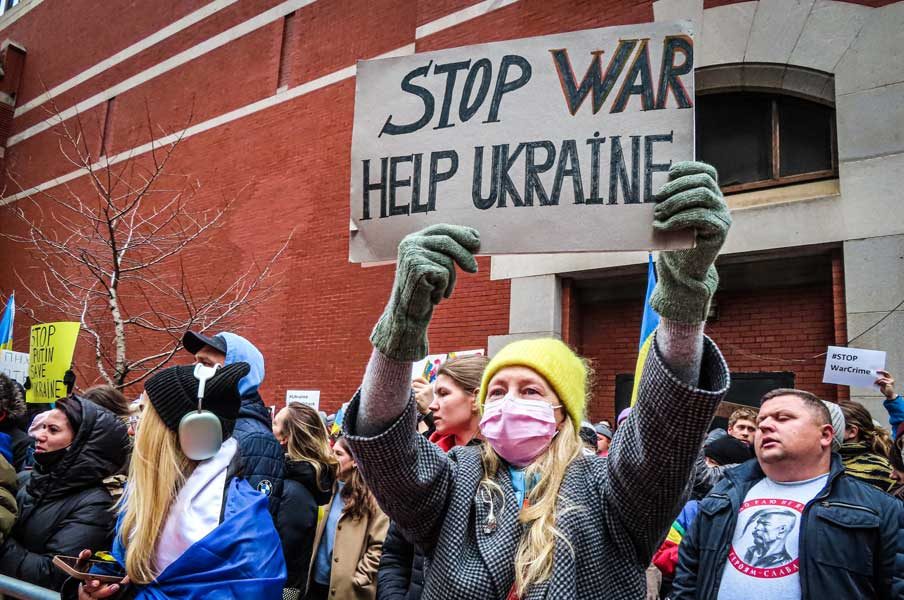On February 24th, 2022, Ukraine was invaded by Russia. What immediately followed consists of sanctions described as unprecedented, unlike anything ever witnessed in the historical record. As of early March, below represents a list of Western responses and sanctions to the Russian invasion of Ukraine.
Note – when documenting Western responses, this encompasses the United States, the European Union, the United Kingdom, Japan, Australia and Canada. Sanctions can be generally defined as a consequence or penalty directed from one country towards another, often as a response to violations of international law.
On the same day of the Russian invasion of Ukraine, the United States and the Biden Administration released an official statement titled “ Russia to Face Massive Costs from its Isolation from the Global Financial and Trade System and Cutting-Edge Technology.”
This initial master list of U.S. sanctions was primarily financial to begin with. They include (but are not limited to):
Severing connections to the U.S. financial system for Russia’s largest financial institutions, including Sberbank, VTB Bank, Bank Orkritie, Novikombank and more, including hundreds of subsidiaries. This includes restricting access to transactions made with the dollar, freezing assets in the U.S. system, and prohibiting U.S. persons from dealing with them
Full Blocking Sanctions on Russian elites and family members. Includes Russian millionaires and billionaires Sergei Ivanov (and his son, Sergei), Nikolai Patrushev (and his son Andrey), Yuriy Solviev (and two real estate companies he owns), Galina Ulyutina, and Alexander Vedyakhin and more.
Halting Russia’s import of technological goods critical to a diversified economy, including denying Russia sensitive technology, especially targeting the defense, aviation and maritime sectors
It is important to note that even before the 2022 Invasion of Ukraine, dating back to 2014 or even prior, Western countries implemented a variety of sanctions against Russia for threatening the independence of Ukraine. Merely days before the invasion itself, on February 21st, 5 Russians were sanctioned by the European Union for activities related to threatening Ukraine.
Aside from sanctions on the banking, financial and economic systems of Russia, sanctions are also heavily directed to major individual political and economic figures of Russia as well. Russian President Vladimir Putin has had his own personal assets frozen across the Western range.
Furthermore, sanctions are also directed against Russia’s critical industrial sectors, including energy, technology, oil, exports, and more. Canada, the EU, and the U.S. have also banned Russian aircraft from flying in their airspace.
On March 3rd, the United States introduced even more individually directed sanctions to Russian oligarchs and their family members if determined to have any connection with funding, supporting and carrying out Russia’s foreign policy against Ukraine. This also includes visa restrictions and freezing personal assets like cash, bank accounts, apartments, yachts, etc.
Days later, on March 5th, in even further attempts to financially and economically isolate Russia, international financial super systems Visa and MasterCard announced they would suspend all of their Russia operations.
Even Western cultural brands like Apple, Nike, Ford and film corporations like Disney, Sony and Warner Bros announced their own responses to Russia as a result of the Ukrainian invasion. For example, Apple announced that Apple products would no longer be exported to Russia, in addition to limiting access, if not completely eliminating, Apple Pay. Film corporations collectively announced their decision to halt future film releases in Russia as well.
In their entirety, the combination of Western sanctions has been described as a coordinated squeeze against Russia. President Volodymyr Zelenskyy of Ukraine has continued to plead for even harsher sanctions on Russia since the beginning of Ukraine’s invasion to present.
Amiyatosh Purnanandam, professor and chair of finance at the University of Michigan’s Ross School of Business, describes the aforementioned sanctions as a “non-violent nuclear attack on Russia’s economic system.”
As of the beginning of March, these sanctions remain subject to change and may either decrease in totality or increase in severity, dependent on the circumstances continuing in Ukraine due to Russia’s invasion. What does remain entirely clear is the intent of these sanctions. As stated by the U.S. Department of the Treasury, the goal is to have both immediate and long-term effects on Russia’s economy, Russia’s involvement in global trade, and Russia’s overall impact as an international state.
Like what we have to say? Sign up to subscribe to email alerts and you’ll never miss a post.










